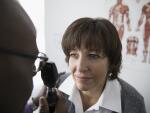
I wore contacts for about 10 years before I started noticing a problem. Each evening during my sophomore year of college, I found myself having to take my contacts out earlier and earlier. They left me with red, itchy, dry eyes. I don’t want to overdramatize the issue, but I’m a graphic designer, so my livelihood depends on visuals. As with most people, outside of my brain, my eyes are the two most valuable things in my head. If they’re uncomfortable, I’m kind of left in a helpless position.
Annoying Enough to Warrant a Trip to the Optometrist
I felt silly going to the optometrist just to complain about my dry eyes. But I’d become irritated enough with the situation I was ready to do something about it. Luckily, connecting with an optometrist was easy. Dr. Gavin Cohen is my family optometrist and has been fitting me with glasses and contacts for over 12 years; I was in middle school when I first saw him.
I’ve gone to him for all my vision issues growing up, and we’ve developed a long-term relationship that’s both professional and friendly. We share a common interest in photography, and I remember showing him some of my photos from a recent trip abroad. To me, it was a symbolic moment; here I was talking about and appreciating the visual medium of photography with the man who has kept my eyes healthy all these years. Dr. Cohen also knows my entire family by name and I know his staff; there’s just a great sense of familiarity and trust that you build up over time. That’s why even though my college was over an hour away from his office, I continued to see him while in school instead of some other doctor nearby.
When I first popped in for an appointment with Dr. Cohen about my dry eyes, I was hoping I’d just pick up some magic cure-all and my eyes would be better in a week. Not the case. He examined my eyes and saw some dry spots forming. Turns out, I produce enough tears, but the quality of my tears isn’t sufficient to keep my eyes lubricated. He told me to switch to glasses, and it became clear this was going to be a chronic issue. That was frustrating to hear.
As for treatment, he recommended fish oil pills and prescription eyedrops. I was hesitant to use the drops initially but I took the fish oil pills for close to a year. They failed to help. Meanwhile, I was spending longer hours working on my computer, and people started commenting on my bloodshot eyes.
Finally, I tried the eyedrops. Dr. Cohen told me it would take several months before I would notice any results from them. When the drops still weren’t helping too much after about a year, he decided to put me on a stronger prescription that I still take today.
My eyes are still prone to irritation. If they tell me they’re done for the day, I go to sleep. But things have generally improved thanks to the combination of the eyedrops and some habitual changes.
Take the Right Kind of Action
From that first visit, Dr. Cohen suggested a number of lifestyle tips to help me manage my dry eyes. He recommended I get a humidifier, sleep with a floor fan instead of a ceiling fan and keep it turned away from my face, and limit screen time on my computer, smart phone and TV. I now make a conscious effort to blink when I’m designing on my computer. It’s hard to tell how much these fixes help, but they’re easy enough to try. Using over-the-counter artificial tears can also reduce irritation to some extent. And when I know I’m going to be outside, I’m more cognizant of the weather forecast; cold, dry and windy conditions can be uncomfortable for my eye, and sunny days can really dry them out, too. Eventually, I picked up a pair of prescription sunglasses to help with bright skies. They are my number one possession now; they’re life-changing.
Going to my optometrist for help was definitely the most beneficial step. Chronic dry eye can be disruptive enough to your daily life that it shouldn’t be laughed off or dismissed. Over the years, Dr. Cohen has consistently done a great job explaining what my treatment options are. And he’s let me decide for myself which options to try. Beyond treatment though, connecting with my optometrist also made me feel good about talking about this understated and chronic problem; he hasn’t been dismissive at all and he makes visiting his office a pleasant experience.
If your eyes are constantly dry, you should address it. And I don’t mean going to pick up some artificial tears or the eyedrops that promise to heal redness. I mean, go get your eyes checked. An optometrist will know how to help.









